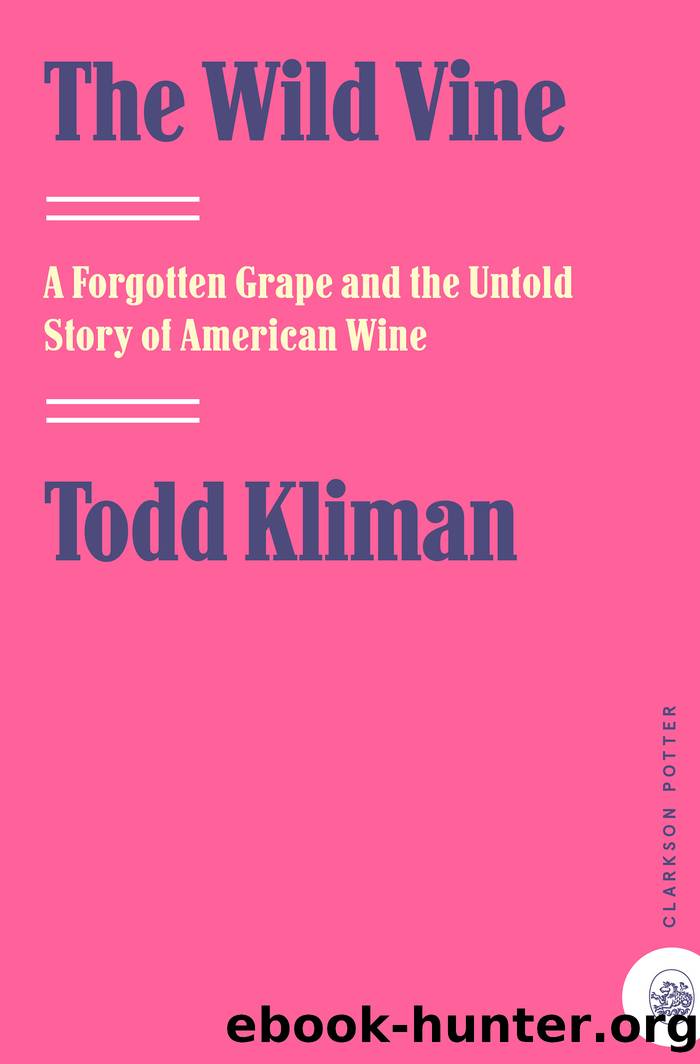The Wild Vine by Todd Kliman

Author:Todd Kliman [Kliman, Todd]
Language: eng
Format: epub
ISBN: 978-0-307-59130-2
Published: 2010-05-03T16:00:00+00:00
15
IN HERMANN, popular lore has it that Prohibition killed the wine industry. âThen came Prohibition,â is the oft-repeated phrase, a grim punch line offered up by the townâs many amateur historians, the deus ex machina of a colorful immigrant story of ingenuity, resourcefulness, and success. âAll those awards and all those medals, the industry was going strong, and things couldnât have been better. And then came Prohibition,â Hermannites say with a shrug and a sigh. They might as well be saying, âAnd then along came the angel of death â¦â
But the truth is more complicated than that. Grand, overarching theories, much like simple, good vs. evil narratives, make for a good story, easily digestible, but seldom one that captures reality in all its messy strangeness. And it was messy strangeness I was after, because it was what I had come to expect and to trust in. Messy strangeness was not a residue of the story of the Norton; more and more, it seemed, messy strangeness was the story.
The truth was, the Nortonâs downfall was being plotted even as the medals were piling up and its long-term future seemed assured, not unlike the tragic and untimely end that awaits a great thoroughbred who is pushed to exceed his levels of endurance and talent, and whose destruction is sowed by his successâruin being the reward of the gods for ignoring history, tradition, and fate.
Husmann had sensed as much, even as he was celebrating the French embrace of his favorite grape. In âThe Future of Grape-Growing in the West,â included in the Tenth Annual Report of the State Board of Agriculture of the State of Missouri for 1874, the same report in which he reported the response to Hermannâs wines in Montpellier, he wrote, âGrape growing in the West, and especially in our State, promising and lucrative as it was in its infancy, is at present under a cloud. The markets are flooded and glutted with cheap wines and low priced grapes, so low, indeed, that they will hardly pay the grower, and it has become a question of vital importance, which every grape-grower anxiously asks, âWill grape-growing and winemaking pay in the future?ââ
He attributed the âdepressionâ in the market to a number of factors, including a lack of professionalism on the part of some of the stateâs winemakers, some of whom, he argued, had believed they could tend to grapes as they could corn. Having devoted himself to the study and introduction of new techniques and processes, he had grown increasingly tired of the amateurism he saw. Worst was the cultivation of too narrow a variety of grapes. Concord and Norton had so dominated production that they discouraged the cultivation of other grapes. Valuable though they were, they were not suited to every taste.
âThe Concord as a market grape does not carry well,â Husmann concluded. âIt has too tender a skin, and although of fair quality, clogs the palate too soon, while the Norton is no market grape at all.â
The doting father
Download
This site does not store any files on its server. We only index and link to content provided by other sites. Please contact the content providers to delete copyright contents if any and email us, we'll remove relevant links or contents immediately.
Machine Learning at Scale with H2O by Gregory Keys | David Whiting(4313)
Never by Ken Follett(3956)
Harry Potter and the Goblet Of Fire by J.K. Rowling(3857)
Fairy Tale by Stephen King(3396)
Unfinished: A Memoir by Priyanka Chopra Jonas(3389)
The Man Who Died Twice by Richard Osman(3078)
Will by Will Smith(2919)
It Starts With Us (It Ends with Us #2) by Colleen Hoover(2367)
Rationality by Steven Pinker(2363)
Can't Hurt Me: Master Your Mind and Defy the Odds - Clean Edition by David Goggins(2341)
The Dark Hours by Michael Connelly(2308)
The Storyteller by Dave Grohl(2236)
Friends, Lovers, and the Big Terrible Thing by Matthew Perry(2230)
The Dawn of Everything: A New History of Humanity by David Graeber & David Wengrow(2208)
The Becoming by Nora Roberts(2202)
The Stranger in the Lifeboat by Mitch Albom(2121)
Cloud Cuckoo Land by Anthony Doerr(2112)
Love on the Brain by Ali Hazelwood(2078)
Einstein: His Life and Universe by Walter Isaacson(2022)
